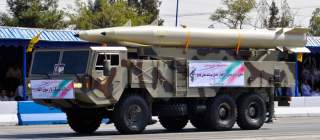Here's What Makes Rogue Nuclear States Really Dangerous
Rogue states' lack of transparency is why the world cannot trust them.
The North Koreans may have just executed their own defense minister for “disloyalty,” which in North Korea can mean anything. Whatever his crime, the regime must have wanted to make a point, since the minister was shot with an anti-aircraft gun in front of hundreds of spectators. (Think of what a weapon meant to down a plane does to a human body.) On the other hand, some claim that he may not have actually been killed as all. As usual, then, no one seems to know what’s going on in North Korea. Was the defense minister a proponent of peace, or an advocate of war? Was he in the nuclear chain of command? Who knows?
“Who’s in charge here” is never a question anyone should have to ask about a nuclear-armed state. The issue of command and control is central to the question of what to do about a nuclear-armed rogue state like North Korea (and soon, Iran). When it comes to war and peace, international stability relies on a certain amount of transparency, especially when it comes to authority over the use of nuclear weapons.
Traditional realists argue that we can contain and deter rogue states as we did with the USSR during the Cold War. This makes a great deal of sense, especially since the alternative to deterrence is to launch preventive war, which is almost never a good idea. History-challenged Americans tend to think preventive war began with the invasion of Iraq in 2003, but the concept has a long pedigree in America. In the 1950s, many prominent voices called for wiping out Stalinist Russia’s nuclear program; in the early 1960s, the Kennedy administration considered a military strike on Communist China to stop Mao Zedong from getting a bomb.
Cooler heads prevailed, obviously, but the urge to hit China in particular was rooted in the belief that Mao Zedong’s China was the rogue state of its day. No one in Washington or Moscow was quite sure who was in charge or who had final say over the use of nuclear arms. Indeed, the Chinese were mostly in danger in the 1960s in direct proportion to the degree to which their internal command and control processes were opaque. As more time passed, however, these mortal enemies all managed to send signals and provide information to establish their arsenals were secure, and these efforts helped to keep the peace.
The stability of nuclear deterrence rests on a certain amount of predictability. Contrary to what most people believe or have seen in movies, the President of the United States cannot simply go berserk and personally order a nuclear strike. Nor can Vladimir Putin, for all his talk, merely open a briefcase and rain down nuclear hell. Orders must be transmitted through civilian and military channels designed specifically to prevent such a moment.
And here we return to North Korea and Iran. We have no idea who really has the authority or the ability to launch nuclear weapons. We can’t even be certain who has custody of the actual bombs. We might have assumed, for example, that the order to use nuclear arms would have to pass from North Korea’s boy-king, Kim Jong-un, to his minister of defense. Since the minister of defense is now scattered in pieces all over a stadium in North Korea, we have to rethink that notion.
And who really runs Iran? In theory, the Islamic Republic has a “president,” but real power resides in a cabal of old mullahs. If Iran were to acquire nuclear weapons, who could say yes—or more important, no—to a nuclear strike?
This will matter a great deal during a crisis. Whom do we watch for signs of impending attack? With whom do we communicate? The Kim family has a capricious tendency to vanish during times of tension; this is the exact opposite of how Americans approach foreign policy, where the president’s visibility and engagement is a sign of reassurance both to allies and enemies. Likewise, if we hear bellicose rhetoric from the Iranian mullahs but reassuring words from an Iranian president, whom do we believe?
This is why it is so difficult to negotiate with rogue regimes, or to trust in their competence, if they are established nuclear powers. It’s bad enough that by their nature they seek to upend the international status quo; far worse is their own inability to define who makes vital decisions of war and peace. While we should resist preventive thinking, the opacity of these regimes during a crisis might make such a temptation overwhelming. If “who’s in charge?” becomes a pressing question, the preventive answer might be: “who cares?”
It’s too late to stop the North Korean bomb, and so we can only remain vigilant and hope for the best. But we don’t need to repeat the same mistake with the Iranians. Handling nuclear weapons is a learned skill, not a shortcut to Great Power status. We learned this by trial and error during the Cold War, and survived not only with hard work but with a huge dose of pure luck. We can’t keep counting on that, especially when dealing with states that make Stalin’s Russia or Mao’s China look like a models of good government.
Tom Nichols is Professor of National Security Affairs at the Naval War College and an adjunct at the Harvard Extension School. His most recent book is No Use: Nuclear Weapons and U.S. National Security (University of Pennsylvania, 2014) The views expressed are his own. You can follow him on Twitter: @RadioFreeTom.
Image: Wikimedia/M-ATF

